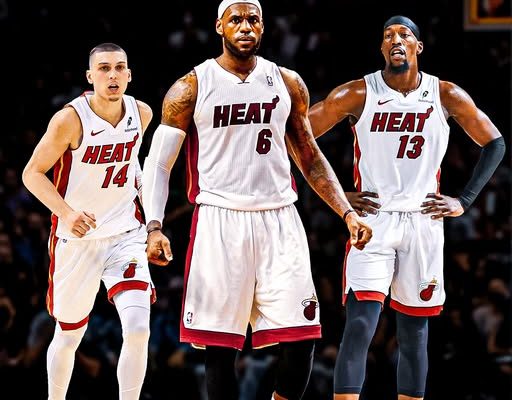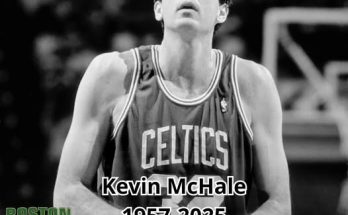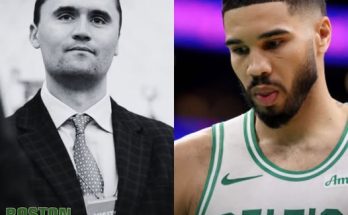If LeBron James ever decides to consider a trade, there is one destination that not only makes sense basketball-wise but also emotionally and historically—Miami. For a player of his stature, legacy is as important as the rings and the records. The Miami Heat offer the rare fusion of organizational excellence, historical resonance, and a cultural fit that would allow James to maximize both the twilight of his career and the narrative arc of one of the greatest to ever play the game. If LeBron is truly looking for a final chapter that encapsulates everything he’s about—greatness, discipline, family, competition, and winning—then there is no better place than South Beach.
LeBron’s time in Miami from 2010 to 2014 wasn’t just the most dominant four-year stretch of his career in terms of championships—it was the crucible that forged the mature, battle-tested version of the player we know today. In Cleveland, he was the young phenom. In Miami, he became the king. Surrounded by Pat Riley’s demanding culture, Erik Spoelstra’s genius, and a no-nonsense locker room anchored by Dwyane Wade and Chris Bosh, LeBron evolved. He won two championships and made four straight NBA Finals. But it was more than just hardware. It was about transformation. It was about becoming a better leader, a more complete defender, a more efficient scorer, and a more mindful teammate. He didn’t just win in Miami. He learned how to win. That foundation remains an essential part of who he is today.
Now, more than a decade removed from the start of the Heatles era, LeBron is again at a crossroads. His current team, the Los Angeles Lakers, is plagued by inconsistency, front-office instability, and a Western Conference that grows younger and deeper each year. The Lakers did win a title in 2020, but since then, the roster has looked increasingly mismatched around LeBron’s skillset and aging body. With Anthony Davis struggling to consistently stay dominant and healthy, and the supporting cast unable to keep pace in key playoff series, it’s becoming increasingly apparent that the Lakers may not have the right formula for another deep run. If LeBron wants to finish his career with a legitimate chance at contending—not merely putting up stats—he needs to be in a place that embodies structure, toughness, and a win-or-die mentality. That’s Miami.
The Heat have everything LeBron could possibly want. For one, there’s Spoelstra, one of the few coaches LeBron has openly praised and respected throughout his career. Spoelstra’s tactical brilliance, adaptability, and calm demeanor would once again allow LeBron to focus on execution rather than direction. Unlike the rotating carousel of coaches in Cleveland or the heavy media glare and celebrity distractions of Los Angeles, Miami offers a tight, disciplined ship where egos are kept in check and the grind is respected. LeBron flourishes in that kind of culture, where the work speaks louder than the words. The Heat’s famous conditioning requirements and no-nonsense ethos mirror what LeBron already does to his body and mind in the offseason. He wouldn’t be adjusting to them—they’d be harmonizing.
Another key element is Pat Riley. While the two had their disagreements when LeBron left Miami in 2014, time has a way of healing competitive wounds. Riley is not only the architect of the Heat’s dynastic culture, but he’s also someone LeBron respects deeply. Riley pushes for excellence without compromise. That’s the kind of accountability LeBron has often missed elsewhere. In Cleveland, he was burdened with player-GM responsibilities. In Los Angeles, the lines between stardom and management have often blurred. But in Miami, there would be no need to carry the organizational torch. Riley runs the show. All LeBron would need to do is play—and that, at this stage, might be the greatest gift he could receive.
The current iteration of the Heat also boasts young, hungry players who would benefit immensely from LeBron’s leadership. Imagine LeBron playing alongside Bam Adebayo—a versatile, defensive-minded big who can pass, rebound, switch, and doesn’t need to dominate the ball to be effective. The synergy between them would be instant. Add Jimmy Butler into the mix—a dogged competitor with a win-at-all-costs mentality—and you have a trio that perfectly blends experience, grit, and basketball IQ. While Butler is older than most typical co-stars, his intensity would pair well with LeBron’s leadership. Both are veterans who understand sacrifice and have proven they can elevate others. The Heat also have a knack for finding undrafted gems and developing them into key contributors—think Caleb Martin, Duncan Robinson, and Jaime Jaquez Jr. With LeBron in the fold, those role players would only improve, benefiting from the open looks, spacing, and opportunities he creates just by being on the floor.
From a basketball standpoint, the Eastern Conference also offers a more navigable path to the Finals than the chaotic gauntlet of the West. While Boston and Milwaukee remain elite, they’re not invincible. The Heat, under Spoelstra, are notorious for being playoff overachievers. LeBron, injected into that system, would turn Miami into an immediate contender—not just on paper, but in reality. Unlike chasing rings by stacking stars, this would be about enhancing an already strong foundation with a proven winner who can still dictate the tempo of a game. The Heat wouldn’t need to break their identity to accommodate LeBron; he would only magnify it.
There’s also the matter of legacy. LeBron’s legacy is already untouchable in many ways—four championships, multiple MVPs, all-time scoring leader. But the end matters. The final chapters of iconic careers have a way of coloring how the entirety is remembered. Michael Jordan’s Wizards years were always footnotes. Kobe Bryant ended his career with one team, scoring 60 in a farewell game that felt like a Hollywood script. LeBron’s final act should not be marked by frustration, early playoff exits, or meaningless stat-padding. It should be about meaning. A return to Miami would be symbolic. It would be full circle. It would offer the rare chance to finish what was started, to close the loop on a journey that elevated not just a franchise, but the player himself.
LeBron also thrives in cities that respect the grind but embrace the star. Miami is a place where celebrities can coexist with athletes without suffocating the focus. It’s not LA, where the entertainment industry overshadows the game, nor is it Cleveland, where the spotlight burned with too much isolation. In Miami, LeBron would be celebrated, respected, and given the space to lead on his own terms. The fanbase already knows what he means to the organization. There would be no need to prove anything. Just compete, just win.
From a business perspective, a move to Miami would also align with LeBron’s growing off-court empire. While he’s built significant roots in Los Angeles, he’s not tethered to one city anymore. His brand is global, his businesses are diversified, and his ambitions go beyond Hollywood. Miami offers access to the global south, to Latin American markets, and a high-profile lifestyle without the distractions. It would also set the stage for his son Bronny, should he eventually join the NBA. Imagine the story: LeBron, back in Miami, still contending, mentoring the next generation—including his own son. Few endings could rival that in emotional and historical weight.



